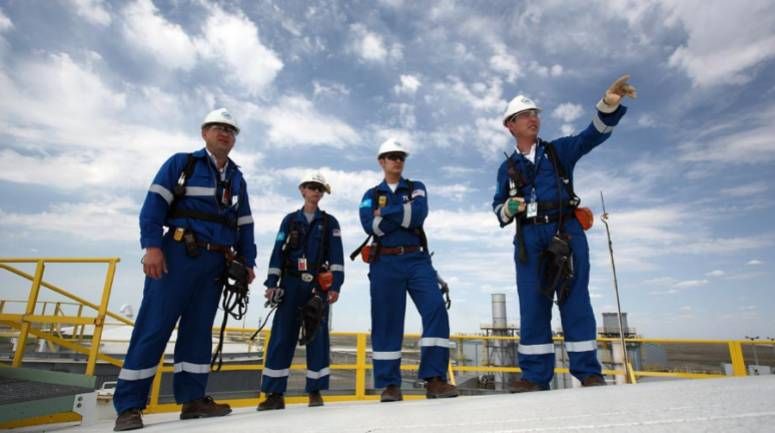 US energy giant Chevron is interested in a construction project for an integrated gas-chemical complex in western Kazakhstan, First Deputy Energy Minister Uzakbai Karabalin told New Europe in an interview.
US energy giant Chevron is interested in a construction project for an integrated gas-chemical complex in western Kazakhstan, First Deputy Energy Minister Uzakbai Karabalin told New Europe in an interview.
“Chevron has such an interest. We can see it when we hold negotiations with our American colleagues (under the Kazakhstan-American Joint Venture Tengizchevoil)," Karabalin said.
At the same time, he emphasized, there is no “clearly defined decision on this account".
“But we (the Kazakh side) will further encourage Chevron's interest in participating in the development of Kazakhstan's gas chemical industry, as the company is a recognised world leader in petrochemical processes," Karabalin said.
It is no secret that, with Chevron as a partner, the government of Kazakhstan is hoping to advance the gas complex project in the west of the country. It is important for Kazakhstan to diversify its economy and to stop being just a raw material supplier to the developed economies.
The former Soviet republic is hoping to be able to offer the world markets not just its crude oil and gas, but also processed goods with an added value and higher price.
Kazakhstan's President Nursultan Nazarbaev had tasked the government with the creation of the country's own petrochemical industry. An integrated gas chemical complex in the Atyrau region in western Kazakhstan should have been the first project in the implementation of that idea.
The new enterprise would make polypropylene (about 500,000 tonnes a year) and polyethylene (800,000 tonnes a year), as well as other petrochemical goods that are in a high demand in the world markets today. As a minimum, Kazakhstan could meet the demand of its Central Asian neighbours in these goods.
The project had been scheduled to be completed at the end of 2015. However, the issue of feed supply for the new complex is still outstanding. The investors would not be prepared to put their money into the project, the total cost of which is $85 million, unless the raw material is available, and its amounts are guaranteed contractually.
According to the Kazakh Ministry of Energy, the idea was that the complex would use the Tengiz gas at the first phase after the commissioning. Later, it would use the gas condensate from Kazakhstan's largest field – Karachaganak, and then – the associated gas from Kashagan.
However, the petrochemical specialists strongly preferred the gas from the Tengiz field that is currently developed by the Kazakh-American Joint Venture TengizChevrOil (TCO). Light in its composition, the Tengiz gas is an excellent raw material for a broad variety of petrochemical goods.
“With respect to Tengiz, I can say that the negotiation process in ongoing (with Chevron). We have no doubts that TCO will be providing gas to the gas chemical complex," Kazakhstan's Energy Minister Vladimir Shkolnik told reporters recently.
Earlier, Energy Ministry's officials had said that about 7 billion cubic metres of associated gas would be directed from Tengiz to the gas chemical complex. Out of that, around 2 billion cubic metres would be processed to produce ethane, propane and butane fractions. The rest would be returned to TCO for reinjection to enhance recovery at Tengiz.
The problem is that TCO cannot really spare those 2 billion cubic metres, as it re-injects all of its associated gas to increase production.
Tengiz is responsible for over one fourth of all oil currently produced in Kazakhstan. In 2014, the Kazakh-American Joint Venture TengizChevrOil produced 26.7 million tonnes of oil, while Kazakhstan's total oil production in 2014 was almost 81 million tonnes.
However, the formation pressure at Tengiz has been falling steadily and has now reduced by half since the beginning of the development of the field. The current level is optimal for production, but the formation pressure will be falling further. This can seriously complicate the production and increase the production cost dramatically.
Therefore, TCO currently concerns itself rather with another project. The Future Expansion Project (FEP), as its name suggests, will focus on expansion of oil production at Tengiz. The FEP will allow the JV to increase the annual output from 26.5 million tonnes to 38.6 million tonnes.
In addition to gas, the FEP will re-inject water to maintain the formation pressure. This may help free up some “surplus" gas that can be sent for processing to the future gas chemical complex.
According to the data of the Kazakh Minister of Energy, the cost of Tengiz' Future Expansion Project is estimated at $38 billion. A final decision on the financing of the FEP is expected to be made before the end of 2015. The construction is scheduled to be completed in mid-2019.
This will directly affect the feed-dependent gas chemical complex which was originally planned to be operational at the end of this year. Now, the in-service date for the complex will most likely be pushed to 2019.
Tengizchevroil LLP was formed between Kazakhstan and Chevron Corporation in 1993 to explore and develop super giant Tengiz oilfield. Today, TCO is the largest and safest company in Kazakhstan which produces and markets crude oil, gas and sulfur.
Source: neurope.eu
 В Атырау
+19
В Атырау
+19  Send your news to AqZhaiyq
Send your news to AqZhaiyq